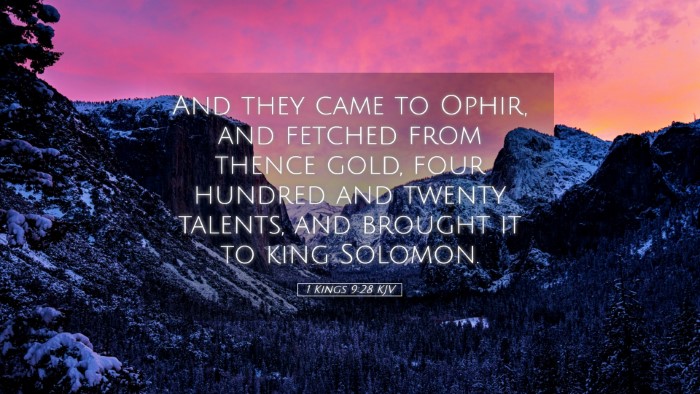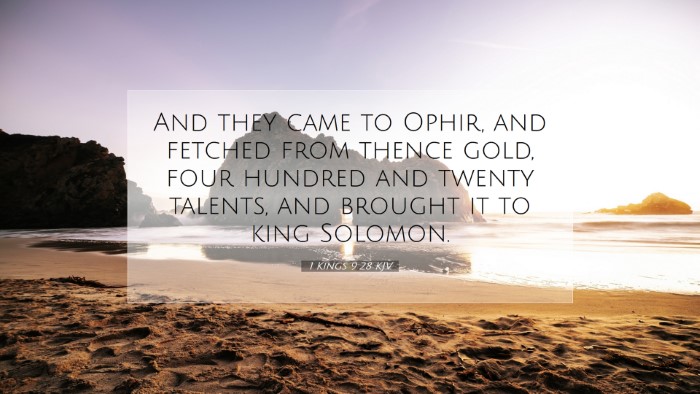Commentary on 1 Kings 9:28
Verse: "And they came to Ophir, and fetched from thence gold, four hundred and twenty talents, and brought it to king Solomon." (1 Kings 9:28, KJV)
Overview
This verse illustrates the wealth and the extensive trading ventures undertaken by King Solomon, particularly through voyages to Ophir. The account is significant not only for its economic implications but also for what it reveals about Solomon's reign, his diplomatic strategies, and his relationship with surrounding nations.
Commentary from Matthew Henry
Matthew Henry emphasizes the grandeur of Solomon's reign, portraying the gold fetched from Ophir as a symbol of God's blessings on Solomon’s endeavors. He notes that the large quantity of gold—four hundred and twenty talents—indicates the vast wealth at Solomon's disposal and reflects his wisdom in securing such resources through trade rather than conquest.
Henry also connects this wealth to the fulfillment of God’s covenant with David, arguing that Solomon's prosperity was a direct result of obedience to God's will. The narrative showcases the providence of God in supporting those who live righteously.
Moreover, Henry points out the importance of understanding where one's resources come from, suggesting that it is essential for leaders and followers alike to recognize God as the ultimate provider of true wealth, both materially and spiritually.
Insights from Albert Barnes
Albert Barnes expands on the geographical significance of Ophir, noting that various locations have been proposed for this ancient place, from India to Africa. The precise location may remain uncertain, but its mention signifies Solomon's extensive trade networks, which enhanced the kingdom's wealth.
Barnes highlights that the mention of a specific amount—420 talents—was not just for narrative detail but served to quantify the scale of Solomon's successful commercial endeavors. This reflects a well-organized trading system and the king’s aptitude in foreign affairs and economics.
Additionally, Barnes discusses the symbolism of gold within the biblical context. Gold is often associated with divinity and purity, implying that the gold brought to Solomon also represented the richness of his wisdom and divine favor, which in turn elevated the entire nation of Israel.
Analysis by Adam Clarke
Adam Clarke interprets the gold's extraction from Ophir as a significant factor in illustrating the Mediterranean world's trade dynamics during Solomon's reign. He emphasizes the historical significance and luxury associated with this trade, linking it to the idea of imperial expansion and prosperity.
Clarke pays specific attention to Solomon’s status among the surrounding nations, arguing that such wealth drew admiration and sometimes envy, which provided opportunities for Solomon to establish alliances and foster peace. This wealth thus became a tool of diplomacy as much as it was a measure of success.
In terms of theological reflection, Clarke notes that while material wealth reflects God’s favor, it is critical for leaders to wield such wealth responsibly and in service to others—emphasizing that riches should support the spiritual and physical well-being of the community, not lead to idolatry or exploitation.
Theological and Practical Implications
This brief narration about Solomon’s acquisition of gold has profound theological and practical implications for contemporary readers. It serves to remind leaders of the biblical principle that all prosperity ultimately comes from God and must be used for His glory and the good of His people.
- Divine Providence: The verse illustrates how God provides abundantly for His people, which can encourage faith in leaders today who seek to honor God in their stewardship.
- Wisdom in Leadership: Solomon’s ability to engage in trade and manage wealth wisely is a model for leaders who aspire to govern effectively and ethically.
- The Richness of Relationships: The interactions between nations signify the importance of building trust and alliances, a principle that remains vital in both ecclesiastical and secular leadership today.
- Informed Stewardship: The accumulation of wealth must lead to responsible stewardship. Church leaders and congregants are called to reflect on how they manage their resources, reflecting the character of God in their communities.
Conclusion
In summary, 1 Kings 9:28 encapsulates the grandeur of Solomon's reign while serving as a reminder of the ways God blesses those who seek to follow Him. It encourages modern-day leaders to engage in ethical trade and relationships while relying on God for wisdom and provision. The insights offered by Matthew Henry, Albert Barnes, and Adam Clarke provide a multifaceted understanding of this significant passage, urging pastors, students, theologians, and scholars to reflect deeply on the interplay of divine providence, wise governance, and the true meaning of wealth.


